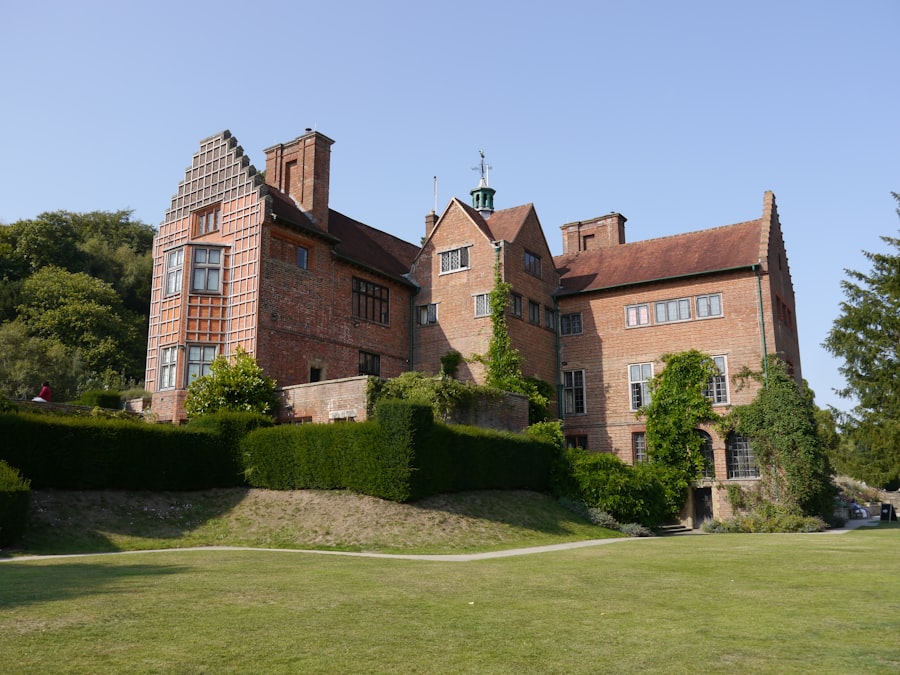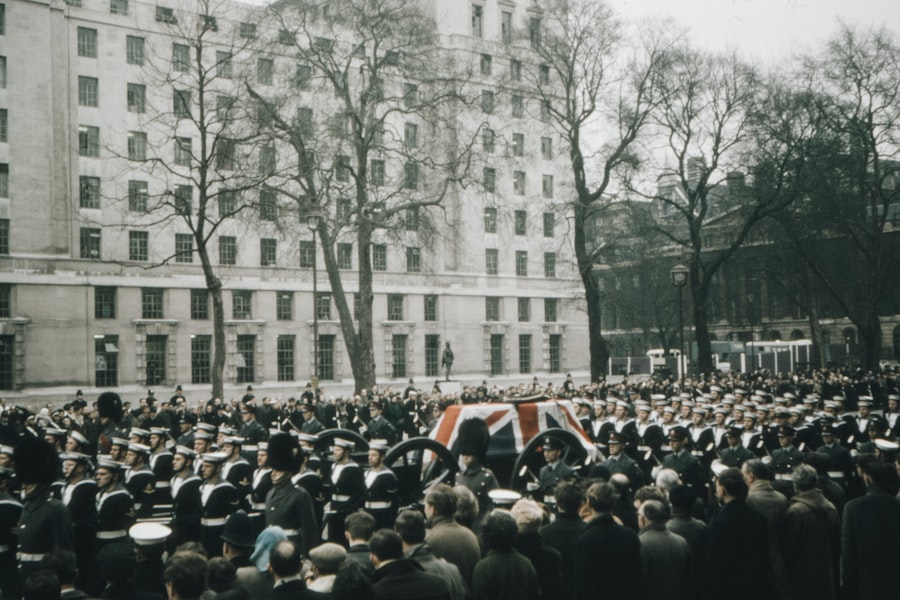Winston Churchill was born on November 30, 1874, into an aristocratic family that had a long history of public service. His father, Lord Randolph Churchill, was a prominent Conservative politician, while his mother, Jennie Jerome, was an American socialite. This unique blend of British nobility and American ambition would shape Churchill’s worldview and ambitions from an early age.
Raised in the family estate of Blenheim Palace, he was exposed to the intricacies of politics and the responsibilities that came with his lineage. However, his early education was marked by struggles; he was not a particularly diligent student and often found himself at odds with the rigid educational system of the time. Churchill’s formal education began at the prestigious Harrow School, where he faced significant challenges.
He was often considered a poor student, struggling with subjects like mathematics and languages. However, he excelled in history and literature, subjects that would later inform his speeches and writings. After Harrow, he attended the Royal Military Academy Sandhurst, where he finally found a sense of purpose.
His time at Sandhurst was transformative; he graduated eighth in his class and was commissioned as a second lieutenant in the Fourth Queen’s Own Hussars in 1895. This military training not only prepared him for a career in the army but also instilled in him a sense of discipline and leadership that would serve him well in his later political endeavors.
Key Takeaways
- Winston Churchill was born into an aristocratic family and received a prestigious education at Harrow and Sandhurst.
- He served in the British Army and later transitioned into politics, holding various government positions before becoming Prime Minister.
- Churchill’s leadership during World War II, including his famous speeches and unwavering resolve, played a crucial role in the Allied victory.
- After the war, Churchill continued his political career, serving as Prime Minister again and receiving numerous honors and awards.
- Churchill had a complex personal life, with multiple marriages and relationships, and he also had a passion for painting and writing.
Military and Political Career
Churchill’s military career began in earnest when he served in Cuba during the Spanish-American War as a war correspondent. His experiences on the battlefield were formative, providing him with firsthand insights into the realities of war. He later participated in campaigns in India and Sudan, where he demonstrated bravery and tactical acumen.
These early military experiences not only bolstered his reputation but also provided him with a platform to launch his political career. In 1900, he entered Parliament as a Conservative MP for Oldham, but his political ideology soon shifted towards liberalism, reflecting his evolving views on social issues. His political career was marked by a series of notable positions and reforms.
In 1904, Churchill crossed the floor to join the Liberal Party, where he championed progressive policies such as social welfare and labor rights. His tenure as First Lord of the Admiralty during World War I was particularly significant; he advocated for naval modernization and played a crucial role in the development of the Royal Navy’s strategy. However, his decision to launch the ill-fated Gallipoli Campaign in 1915 led to significant losses and tarnished his reputation temporarily.
Despite this setback, Churchill’s resilience and ability to adapt would see him return to prominence in British politics.
Leadership During World War II

As World War II erupted in 1939, Churchill’s leadership became pivotal for Britain and its allies. Appointed Prime Minister in May 1940, he faced an unprecedented crisis as Nazi Germany threatened to engulf Europe. His oratory skills became legendary during this period; speeches such as “We shall fight on the beaches” rallied the British public and instilled a sense of determination in the face of adversity.
Churchill understood that morale was as crucial as military strategy, and he worked tirelessly to inspire confidence among both civilians and soldiers. Churchill’s strategic vision during the war was characterized by his willingness to forge alliances with other nations. He recognized early on that defeating Hitler required collaboration with the United States and the Soviet Union, despite their differing ideologies.
His relationship with President Franklin D. Roosevelt was particularly significant; their shared commitment to defeating fascism laid the groundwork for future cooperation between their nations. Churchill’s ability to navigate complex international relations while maintaining domestic support was instrumental in sustaining Britain’s war effort.
Post-War Political Career
After World War II ended in 1945, Churchill faced a new political landscape. The Labour Party won a landslide victory in the general election, leading to his temporary ousting from power. However, Churchill remained an influential figure within British politics and continued to advocate for his vision of a united Europe.
He recognized the need for cooperation among European nations to prevent future conflicts and famously called for the establishment of a “United States of Europe” in a speech delivered at Zurich University in 1946. In 1951, Churchill returned to power as Prime Minister for a second term, during which he focused on foreign policy issues such as the Cold War and decolonization. His experience during World War II informed his approach to international relations; he sought to maintain Britain’s influence while navigating the complexities of a rapidly changing world.
His tenure saw significant developments, including the establishment of NATO and efforts to address the challenges posed by emerging superpowers like the Soviet Union and China.
Personal Life and Relationships
Churchill’s personal life was as complex as his political career. He married Clementine Hozier in 1908, and their partnership proved to be a source of strength throughout his tumultuous life. Clementine was not only a devoted wife but also an astute political confidante who provided counsel during critical moments.
Their relationship endured numerous challenges, including Churchill’s long absences due to war and politics, yet they maintained a deep bond characterized by mutual respect and affection. Churchill’s family life extended beyond his marriage; he had five children who played various roles in his life. His son Randolph followed in his father’s footsteps into politics but struggled with personal issues throughout his life.
Churchill’s relationship with his children was often strained due to his demanding career, yet he remained committed to their education and upbringing. His love for painting and writing also provided an outlet for personal expression; these pursuits allowed him to escape from the pressures of public life and connect with his creative side.
Literary and Artistic Pursuits

Winston Churchill was not only a statesman but also an accomplished writer and artist. His literary contributions are extensive; he authored numerous books on history, politics, and war, earning him the Nobel Prize in Literature in 1953. His most notable works include “The Second World War,” a six-volume series that provides an exhaustive account of the conflict from his perspective as a leader.
In addition to his literary achievements, Churchill was an avid painter. He took up painting as a hobby during his time at Chartwell, his country home, finding solace in nature’s beauty.
His artistic endeavors allowed him to express himself creatively while providing a therapeutic escape from the pressures of political life.
Legacy and Impact
Winston Churchill’s legacy is multifaceted; he is remembered as one of the most significant leaders of the 20th century. His role during World War II solidified his status as a national hero in Britain and earned him admiration worldwide. The resilience he displayed during one of history’s darkest periods continues to inspire leaders today.
His speeches remain iconic examples of effective communication during crises, emphasizing the importance of hope and determination. Churchill’s impact extends beyond wartime leadership; he played a crucial role in shaping post-war Europe through his advocacy for unity among nations. His vision for a collaborative Europe laid the groundwork for institutions like the European Union, which aimed to foster peace and cooperation among member states.
Furthermore, his writings continue to influence historians and political theorists alike, providing insights into leadership, strategy, and human resilience.
Criticisms and Controversies
Despite his many accomplishments, Churchill’s legacy is not without criticisms and controversies. His views on imperialism have drawn scrutiny; he often expressed beliefs that reflected colonial attitudes prevalent during his time. Critics argue that his policies contributed to suffering in various regions under British rule, particularly in India during the Bengal famine of 1943 when millions perished due to food shortages exacerbated by wartime policies.
Additionally, Churchill’s approach to race relations has been criticized for its insensitivity; some historians contend that he held prejudiced views towards certain ethnic groups. His handling of issues related to decolonization has also been questioned; while he advocated for European unity post-war, critics argue that he failed to adequately address the rights of colonized nations seeking independence. These controversies complicate Churchill’s legacy, prompting ongoing debates about how history should remember this complex figure who played such a pivotal role in shaping modern Britain and global politics.
In exploring the intricate details of Winston Churchill’s life as depicted in Martin Gilbert’s comprehensive biography, readers may find additional insights in related articles that delve into the broader historical context of his era. For instance, an article on Hellread provides further exploration of the political and social dynamics that shaped Churchill’s leadership. To gain a deeper understanding of these influences, you can read more in this related article. This piece complements Gilbert’s work by offering a nuanced perspective on the challenges and triumphs that defined Churchill’s legacy.
FAQs
Who was Winston Churchill?
Winston Churchill was a British statesman, army officer, and writer who served as Prime Minister of the United Kingdom from 1940 to 1945 and again from 1951 to 1955. He is widely regarded as one of the greatest wartime leaders of the 20th century.
What were Winston Churchill’s major accomplishments?
Churchill is best known for his leadership during World War II, where he rallied the British people and led the country to victory against Nazi Germany. He also played a key role in shaping post-war Europe and was a vocal advocate for the United Nations.
What were some key events in Winston Churchill’s life?
Churchill had a long and varied career, serving as a soldier, journalist, and politician. He held numerous government positions, including First Lord of the Admiralty, Chancellor of the Exchequer, and Minister of Munitions. He also won the Nobel Prize in Literature for his historical writings.
What was Winston Churchill’s leadership style?
Churchill was known for his inspiring speeches, determination, and resilience in the face of adversity. He was a charismatic and forceful leader who was not afraid to make tough decisions, earning him the respect and admiration of the British people.
What is Winston Churchill’s legacy?
Churchill’s legacy is one of courage, leadership, and determination. He is remembered as a symbol of British resolve during World War II and as a champion of democracy and freedom. His speeches and writings continue to inspire people around the world.







